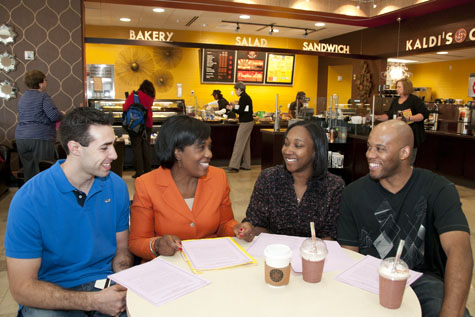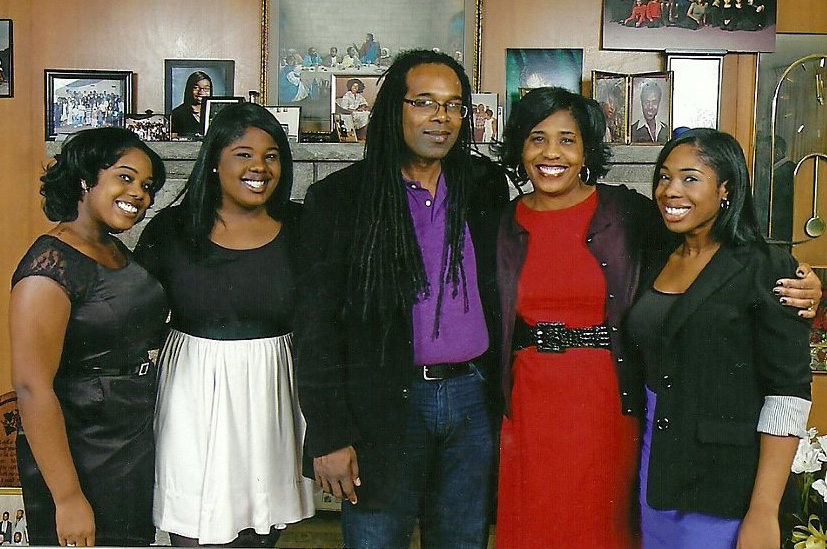
Robert Boston
Rochelle Smith (second from left) talks with students (from left) David Cotter, Paige Cooper and Donell Carey, all graduate students in the Division of Biology and Biomedical Sciences, about volunteer opportunities.
Rochelle Smith has a knack for recruiting underrepresented graduate students in the sciences to Washington University.
In the past five years, the number of minority students entering graduate programs each year in the biomedical sciences has almost tripled, as have the number of students entering the Medical Scientist Training Program (MSTP) and the Division of Biology and Biomedical Sciences’ (DBBS) summer research programs for undergraduate students. She travels the country to recruit students and finds ways to bring them to the university so they can see it firsthand.
Smith is director of diversity, summer programs and community outreach for DBBS. She is known for her magnetic personality that puts students, faculty and staff at ease.
“Rochelle represents the best of WUSTL,” says Brian Sullivan, executive director of the university’s MSTP. “She balances her commitment to excellence and effectiveness with a concern for the individual, which results in changes not only to structures but also to hearts and minds.”
A heart for students
Smith’s track record at the School of Medicine is impressive. When she joined DBBS in 2006 as manager of diversity programs and summer outreach, she saw a lot of opportunities. She formed groups for the black biomedical graduate students and the Latin American graduate students. While open to all students, each group provides cultural support for minority medical and graduate students.
In addition, Smith has set up opportunities for students from historically black colleges and universities to visit the School of Medicine and meet other students and faculty.
“I love the student interaction,” Smith says. “I love advising students, recruiting them, then helping them navigate here and seeing their dreams come true.
“I let them know that no matter what, they can achieve their goals,” she says. “We as a division are here for them all the way, and I’m here for them all the way.”
Smith spends half the fall semester and about 20 percent of the spring semester visiting other colleges and universities to recruit undergraduate students interested in science and medicine.
With a strong interest in science and medicine herself and a need to live at home and work while in college, Smith earned an associate’s degree in biological sciences from South Suburban College in South Holland, Ill.
“When I started college, I spent eight hours a day reading medical journals and articles and textbooks in the library because I was trying to figure out what I wanted to do,” she says.
She went on to earn a bachelor’s degree in psychology from Chicago State University.
“I really think that had I had the right advisers in college, I would have been a physician or a scientist,” she says. “That’s one thing that drives me. I know now what I lacked in my own education and what I needed.”
So during orientation each fall when Smith sees students she has recruited in the entering class, she compares it to a holiday of sorts.
“I feel like it’s Christmas, like what we do here matters,” she says. “It shows me that they trusted us enough to come, and now we get to show them all the greatness that we told them about.”
Vovanti Jones, a third-year MSTP student, first met Smith while an undergraduate at the University of Maryland, Baltimore County. Jones came to WUSTL for the Biomedical Research Apprenticeship Program (BioMedRAP), a 10-week summer research program for students from backgrounds traditionally underrepresented in the sciences, in the summer of 2008.
“I probably would not have come to school here if not for Rochelle,” Jones says. “The support and friendship that she provided over that summer really made me feel comfortable here. Since I’m here working on an MD/PhD degree, I’m always in contact with her.”
Smith continues to create new opportunities. She established a scholars symposium last spring to showcase diversity within the university’s research community and the accomplishments of scientists from historically underrepresented backgrounds. She also worked with Mary Bradley, director of postdoctoral affairs in DBBS, to set up a diversity lecture series, which features a relevant lecture per semester.
In addition to overseeing three undergraduate summer research programs — BioMedRAP, the Amgen Scholars and the National Science Foundation’s Cellular and Developmental Biology Research Apprenticeship programs — Smith also is working with Adrienne Davis, JD, vice provost and the William M. Van Cleve Professor of Law, on a variety of projects, including a minority faculty-mentoring program.
Love for WUSTL
One of the forces that drives Smith is her love of Washington University, which began in 1990 when she and her husband, Jonathan Smith, PhD, now an instructor of African American studies at Saint Louis University, arrived in St. Louis from Ithaca, N.Y., so Jonathan could begin WUSTL’s Master of Fine Arts program.
“I thought this was going to be a two- to three-year commitment,” Rochelle Smith says. “But sweet Jim McLeod and Wayne Fields encouraged my husband to apply for the Chancellor’s Fellowship and get a PhD in English. He did, and we never left.”

While her husband was in graduate school, Smith asked the late McLeod, who later became her mentor, if she could start a support organization for spouses of graduate students. He said yes, but Smith already had taken a full-time job as a pharmaceutical company representative. A few years later, though, her chance to nourish the medical center community unfolded as she began working at Barnes-Jewish Hospital, first as a youth mentoring program assistant and later as an emergency room patient relations representative.
In 1999, she joined WUSTL’s Cornerstone: The Center for Advanced Learning, which provides academic support for students, and was later named a learning resource specialist, developing educational and cultural programs for a variety of students, including those from low-income or at-risk backgrounds.
She noticed that many students from underrepresented backgrounds who had entered the university as premed majors were not graduating as premed majors. To address this, she started a Premed Achievement Committee, which included Harvey Fields, PhD, assistant director of academic programs, and set up support services. After that committee was established, the number of students from underrepresented backgrounds graduating and going directly to graduate school increased from one or two a year to 16 or 18 a year.
In 2004, Smith was in a near-fatal car accident that left her with a crushed hand.
“My Wash. U. family just rallied around me,” she says. “They were so kind, and that really helped in my healing. I knew I was coming back to people who cared about me, and we shared the passion for the work.”
With all of her travels to other colleges and universities, Smith has many with which to compare Washington University.
“We have the perfect mix of excellence and collegiality and downright niceness that converges for a fantastic experience,” she says. “The opportunities for people who can dream big, especially when it involves helping people, that’s what we’re about. I love the overall personality of our institution.
“We want to give back, we want to reach out, and that suits me just fine.”
Fast facts about Rochelle Smith
Reading: All My Life: A Memoir by Susan Lucci; E.M. Bounds’ books on prayer; Song of Solomon by Toni Morrison
Family: Husband, Jonathan; and daughters Lauren, 26, Rachel, 23, and Mariah, 20
Pets: Two dogs, Lucky and Swarley
Hobbies: Now empty nesters, the Smiths enjoy trying new local restaurants. They also are very involved in their church, Blessed Hope Missionary Baptist Church, and host choir practice at their home every weekend.
Education: Now working on a master’s degree in applied health behavior research at WUSTL